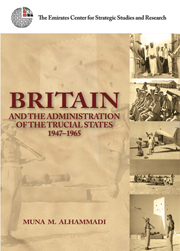Book contents
- Frontmatter
- Contents
- Abbreviations and Acronyms
- Preface
- Introduction
- 1 British Administration in the Trucial States before 1965
- 2 The Trucial Oman Levies and Scouts, 1951–1965
- 3 The Trucial States Council, 1952–1965
- 4 The British Role in the Development of the Trucial States before 1965
- Conclusion
- Notes
- Bibliography
- About the Author
- Index
4 - The British Role in the Development of the Trucial States before 1965
Published online by Cambridge University Press: 05 September 2014
- Frontmatter
- Contents
- Abbreviations and Acronyms
- Preface
- Introduction
- 1 British Administration in the Trucial States before 1965
- 2 The Trucial Oman Levies and Scouts, 1951–1965
- 3 The Trucial States Council, 1952–1965
- 4 The British Role in the Development of the Trucial States before 1965
- Conclusion
- Notes
- Bibliography
- About the Author
- Index
Summary
Alhough its control of the Trucial States was obvious up to the mid-twentieth century, Britain was eventually to restrict its focus in the region purely to matters relating to defense and international relations. The intent was to avoid any obligation towards the development of the emirates, which were considered as merely falling under British protection, rather than being part of a British protectorate. Hence, the British government avoided committing itself to the obligations stipulated in the United Nations Charter regarding the provision of information on certain conditions within countries subject to its control. Furthermore, other than opening a small clinic in Dubai, Britain did not undertake any development projects in the emirates until 1954.
Up until the mid-1960s the emirates were incapable of developing education, health and social services owing to their lack of funds. Prior to the discovery of oil they relied on customs and tax revenues levied on palm plantations, as well as fishing and pearling boats. These revenues barely covered the rulers’ expenditures in their respective emirates. Even with the emergence of oil exploration concessions, the emirates remained incapable of catching up with neighboring countries like Kuwait and Bahrain. In this respect, Sir Arnold Wilson wrote:
… [T]he impartial historian will record that, during this period, whilst in our own interests maintaining public order and health with exemplary solicitude, and paying, as a great maritime nation should, some attention to marine surveys and to the lighting and buoying of the [Arabian] Gulf and to cable and wireless communication, we made nowhere, except at Abadan and on the oil fields, any attempt to establish schools or colleges, or to assist the inhabitants to develop local industries, or to fit them to take their place in a rapidly changing world …
- Type
- Chapter
- Information
- Britain and the Administration of the Trucial States (1947–1965) , pp. 117 - 140Publisher: Emirates Center for Strategic Studies and ResearchPrint publication year: 2013



